This list contains all twelve official flags of provinces of the Netherlands, including the pennons.
| Province | Coat of arms | Flag | Pennon | Description | Adoption |
|---|---|---|---|---|---|
Drenthe  |
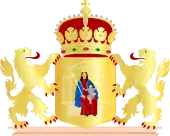 |
 |
White and red are the colours of a former leader, the Bishop of Utrecht. The black castle and red stars are a memory of Coevorden standing up against the Bisshop.[1] See Flag of Drenthe. | 19 February 1947 | |
Flevoland  |
 |
 |
Blue is the symbol of IJsselmeer, from which the land of this province was taken. Green is standing for vegetation, yellow for the cornfields. The lily refers to Cornelis Lely, who designed the plans for the new land taken from IJsselmeer.[2] See Flag of Flevoland | 9 January 1986 | |
Friesland  |
 |
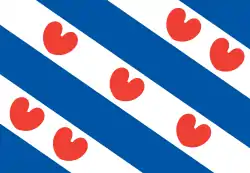 |
The flag is based on the kings of Frysia in 15th century. The colours are the same as those of the national flag of The Netherlands |
11 February 1958 | |
Gelderland  |
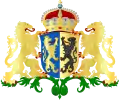 |
 |
The colours are taken from the coat of arms, in which the lions from former duchesses are combined. See Flag of Gelderland | 15 April 1953 | |
Groningen |
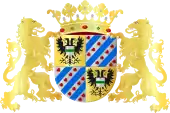 |
 |
The flag combines the colours of the city of Groningen |
17 February 1950 | |
Limburg |
 |
.svg.png.webp) |
Two horizontal bands of equal height; above silver (white), below gold (golden yellow), separated by a narrower band of blue; over all, placed on the breeches side (mast side) and facing it, a crowned, red lion with double tail. See Flag of Limburg | 28 June 1953 | |
North Brabant  |
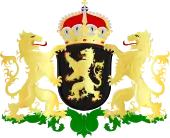 |
 |
The North Brabantian flag dates from the Middle Ages and has the highest seniority among all Dutch province flags. The colours gules and argent have been used in Brabant standards, flags and pennants since the proclamation of the County of Louvain (942 CE) during the Lotharingian period. Later, the Duchy of Brabant continued using these colours. During the Middle Ages and the centuries after, the red and white would often be used. At the end of the 18th century, the flag fell into disuse. Since 1959, the red and white checkered flag has become the official flag of the province of North Brabant. See Flag of North Brabant | 21 January 1959 | |
North Holland  |
 |
 |
The colours of the flag are similar to the colours of the coat of arms, which is a combination of the coat of arms from Holland and West Friesland |
22 October 1958 | |
Overijssel |
 |
 |
The yellow and red stripes are a reference to the former association of this province with Holland. The blue source in the middle stands for the river IJssel, which gave the province its name. See Flag of Overijssel | 20 August 1948 | |
South Holland  |
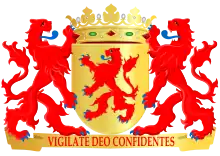 |
 |
The flag is a banner of the coat of arms of Holland. See Flag of South Holland | 24 October 1985 | |
Utrecht  |
 |
-Flag.svg.png.webp) |
From 1528, the bishop of Utrecht used a red flag with a white cross. This flag is still seen in the upper canton. See Flag of Utrecht | 15 January 1952 | |
Zeeland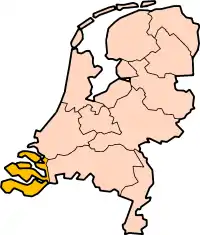 |
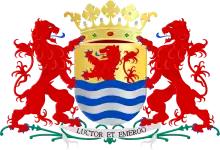 |
 |
In the middle of the flag, the coat of arms of the province is seen. The blue waves stand for the sea, and efforts to subdue its strength. The lion is a symbol for the winner of this battle between man and sea. See Flag of Zeeland | 14 January 1949 |
Map illustrating provinces of the Netherlands and their flags
Historical flags
| Province | Coat of arms | Flag | Pennon | Description | Adoption |
|---|---|---|---|---|---|
South Holland  |
 |
.svg.png.webp) |
A yellow flag with a red horizontal stripe through the middle. | 22 July 1948 |
See also
Wikimedia Commons has media related to Flags of provinces of the Netherlands.
References
- ↑ "Provincie Drenthe - Hoe ziet de vlag van Drenthe er uit?". Provincie.drenthe.nl. 2008-01-31. Retrieved 2011-09-28.
- ↑ "Provincie Flevoland - Vlag en Wapen". Flevoland.nl. 2010-01-12. Archived from the original on 2013-08-01. Retrieved 2011-09-28.
This article is issued from Wikipedia. The text is licensed under Creative Commons - Attribution - Sharealike. Additional terms may apply for the media files.

